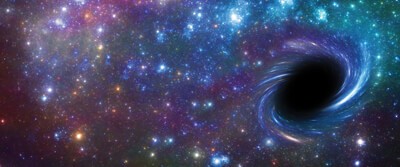Record-Breaking Snack Attack from Black Hole

By Justin Kovach
We have witnessed dozens of stars served up as the main course for the super hungry black holes of the universe, but we have never seen the buffet that researchers at the University of New Hampshire recently observed.
Generally, black holes feast on stars that are close to them for an average of a year. It's called a tidal disruption event (TDE) and we've been detecting them since the 1990s. Using data from three X-ray telescopes from NASA, Swift and the European Space Agency (ESA), researchers have been able to view evidence of a major TDE.
TDEs are caused by the intense gravitational pull created by a black hole. Objects such as stars that get too close to a black hole can be destroyed, sometimes also flinging debris out at high speeds. Everything that isn’t ejected falls into the black hole. The “consumed” material heats up to millions of degrees, causing it to generate multi-wavelength X-ray flares that can be viewed by satellites.
A Long Abbreviated Name
XJ1500+0154 is the abbreviated name of an X-ray source from a black hole in a small galaxy about 1.8 billion light years from Earth. Studying X-ray data from this supermassive black hole showed that radiation levels from the material surrounding the black hole are extremely high. This occurs because the Eddington limit (or luminosity) has been exceeded. (The Eddington limit is the balance between the outward radiation pressure and the inward pull of a black hole’s gravity.)
From studying this specific black hole, physicists have concluded that supermassive black holes can grow significantly from TDEs and surpass the Eddington limit. This has also helped scientists understand how supermassive black holes reach sizes greater than a billion times the size that our own sun was in the early days of the universe.
Scientific models predict that this extremely ravenous black hole will soon run out of “food” and eventually disappear from our prying eyes — extinguishing its presence in our universe.
Discussion Questions
- What happens to time and space in a black hole?
- What is the difference between a black hole and a worm hole?
- Are black holes common in the Universe? Where is the closest black hole to earth?
- Gravity
- X-ray
- Black Hole
- Radiation

